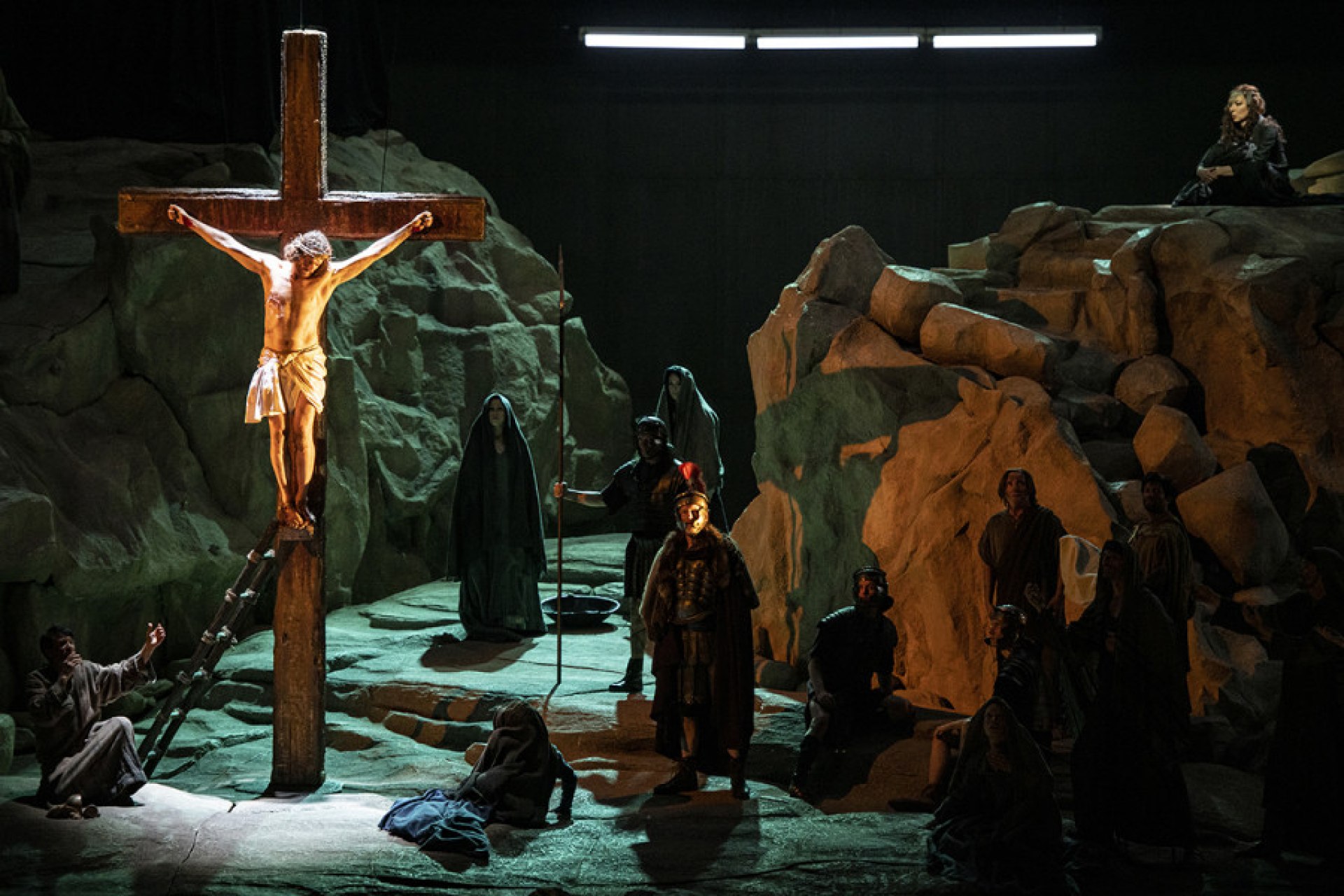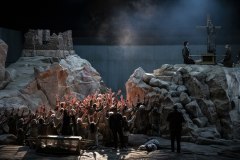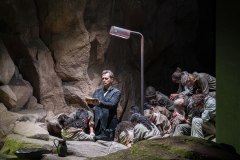Parsifal
Mo | Tu | We | Th | Fr | Sa | Su |
Opera and poem by Richard Wagner
First performed on 26th July, 1882 in Bayreuth
Premiered at the Deutsche Oper Berlin on 21. October, 2012
5 hrs 30 mins / 2 intervals
In German language with German and English surtitles
Pre-performance lecture (in German): 45 minutes prior to each performance
recommended from 16 years
About the performance
About the work
Drawing loosely on motifs from Christianity, Buddhism, assorted legends and Schopenhauer’s philosophy, Richard Wagner eventually completed a myth of his own, PARSIFAL. The work that he dubbed a “stage-hallowing play” tells the story of a “pure fool” who is blissfully unaware of his own nature and calling. Parsifal sallies forth into the ascetic brotherhood of the Knights of the Grail and into another very different world, that of Klingsor’s erotically charged garden, where a kiss from Kundry infuses him with an enlightenment that leads him to release Amfortas, the King of the Grail, from his suffering and redeem the brotherhood.
Wagner himself harboured a desire for redemption for decades and PARSIFAL was the channel through which he wrestled with the theme of spiritual rescue on both a personal and societal level. He shows society yearning for a strong leader as the architect of its own renewal. However, not even the installation of Parsifal as the new king can break the stagnated ritual of wielded power.
Synopsis
Act 1
Scene 1
In a forest near the seat of the Grail and its knights, Gurnemanz, an elder knight of the Grail, wakes his young squires and leads them in morning prayer ("He! Ho! Waldhüter ihr"). Their king, Amfortas, has been stabbed by the Holy Spear, once bequeathed to him into his guardianship, and the wound will not heal.
Kundry arrives in a frenzy, with soothing balsam from Arabia. The squires eye Kundry with mistrust and question her. They believe Kundry to be an evil pagan witch. Gurnemanz restrains them and defends her. He relates history of Amfortas and the spear; it was stolen from him by the failed knight Klingsor.
Gurnemanz's squires ask how it is that he knew Klingsor. Gurnemanz tells them that Klingsor was once a respected knight, but, unable to cleanse himself of sin, castrated himself in an effort to attain purity, but instead became an evil monstrosity.
Parsifal enters, carrying a swan which he has killed. Shocked, Gurnemanz speaks sternly to the lad, saying that this land is a holy place, not to be defiled by murder. Remorsefully the young man breaks his bow in agitation and casts it aside. Kundry tells him that she has seen that his mother has died. Parsifal, who cannot remember much of his past, is crestfallen.
Gurnemanz wonders if Parsifal might be the predicted "pure fool"; he invites Parsifal to witness the Ceremony of the Uncovering of the Grail, which renews the knights' immortality.
Orchestral interlude – Verwandlungsmusik (Transformation music)
Scene 2
The voice of the retired king Titurel resounds from a vaulted crypt in the background, demanding that his son Amfortas uncover the Grail and serve his kingly office ("Mein Sohn Amfortas, bist du am Amt?"). Only through the immortality-conferring power of the sacred chalice and the Saviour's blood contained therein may Titurel himself, now aged and very feeble, live on. Amfortas is overcome with shame and suffering ("Wehvolles Erbe, dem ich verfallen"). He, the chosen guardian of the holiest of relics, has succumbed to sin and lost the Holy Spear, suffering an ever-bleeding wound in the process; uncovering the Grail causes him great pain. The young man appears to suffer with him, clutching convulsively at his heart. The knights and Titurel urge Amfortas to reveal the Grail ("Enthüllet den Gral!"), and he finally does. The dark hall is illuminated by its radiant light and the round table of the knights is miraculously filled with wine and bread. Slowly all the knights and squires disappear, leaving Gurnemanz and the youth alone. Gurnemanz asks the youth if he has understood what he has seen. As the boy is unable to answer the question, Gurnemanz dismisses him as just an ordinary fool after all and angrily exiles him from the realm with a warning to let the swans in the Grail Kingdom live in peace.
Act 2
Scene 1
Klingsor's castle and enchanted garden. Waking her from her sleep, Klingsor conjures up Kundry, now transformed into an incredibly alluring woman. He calls her by many names: First Sorceress (Urteufelin), Hell's Rose (Höllenrose), Herodias, Gundryggia and, lastly, Kundry. She mocks his self-castrated condition but cannot resist his power. He resolves to send her to seduce Parsifal and ruin him as she ruined Amfortas before.
Scene 2
The youth walks into a wondrous garden, surrounded by beautiful and seductive flowermaidens. They call to him and entwine themselves about him while chiding him for wounding their lovers ("Komm, komm, holder Knabe!"), yet the boy in his childlike innocent naïveté doesn't comprehend their temptations and shows only little interest in them. The flowermaidens soon fight and bicker among themselves to win his devotion, to the point that he is about to flee, but a different voice suddenly calls out "Parsifal!". The youth finally recalls this name is what his mother called him when she appeared in his dreams. The flowermaidens back away from him and call him a fool as they leave him and Kundry alone.
Parsifal wonders if the whole Garden is but a dream and asks how it is that Kundry knows his name. Kundry tells him she learned it from his mother ("Ich sah das Kind an seiner Mutter Brust"), who had loved him and tried to shield him from his father's fate, the mother he had abandoned and who had finally died of grief. She reveals many parts of Parsifal's history to him and he is stricken with remorse, blaming himself for his mother's death. Kundry tells him that this realization is a first sign of understanding and that, with a kiss, she can help him understand the love that had once united his parents, wanting thus to awake in Parsifal the first pangs of desire. However, as she kisses Parsifal, the youth suddenly recoils in pain and cries out Amfortas' name: having just felt for the first time material desire with Kundry's kiss, Parsifal finds himself in the same position in which Amfortas had been seduced and he feels the wounded king's pain and suffering of evil and sin burning in his own soul. Only now does Parsifal understand Amfortas' passion during the Grail Ceremony ("Amfortas! Die Wunde! Die Wunde!").
Furious that her ploy has failed, Kundry tells Parsifal that if he can feel compassion for Amfortas, then he should also be able to feel it for her. In a distant past, she saw the Redeemer and mockingly laughed at His pains in malice. As a punishment for this sin she has been cursed and bound by Klingsor and has fallen under his yoke. The curse condemns her to never be able to die and find peace and redemption. She cannot weep, only jeer diabolically. Longing for deliverance, she has been waiting for ages for a man to free her from her curse and yearns to once more meet the Saviour's forgiving gaze, but her search for her redeemer in the end only ever turns into a desire to find her salvation in earthly desire with those who fall for her charms. All her penitent endeavours eventually transform into a renewed life of sin and a continued unredeemed existence in bondage to Klingsor. When Parsifal still resists her, Kundry curses him through the power of her own accursed being to wander without ever finding the Kingdom of the Grail again, and finally calls on her master Klingsor to help her.
Klingsor appears on the castle rampart and hurls the Holy Spear at Parsifal to destroy him. He seizes the spear in his hand and makes with it the sign of the Cross, banishing Klingsor's dark sorcery. The whole castle with Klingsor himself suddenly sinks as if by terrible earthquake and the enchanted garden withers. As Parsifal leaves, he tells Kundry that she knows where she can find him.
Act 3
Scene 1
The scene takes place many years later. Gurnemanz is now aged and bent, living alone as a hermit. It is Good Friday. He hears moaning near his hut and finds Kundry lying unconscious in the brush, similarly as he had many years before ("Sie! Wieder da!"). He revives her using water from the Holy Spring, but she will only speak the word "serve" ("Dienen"). Looking into the forest, Gurnemanz sees a figure approaching, armed and in full armour. The stranger removes his helmet and Gurnemanz recognizes the lad who shot the swan; to his amazement the knight also bears the Holy Spear.
Kundry washes Parsifal's feet and Gurnemanz anoints him with water from the Holy Spring, recognizing him as the pure fool, now enlightened by compassion and freed from guilt through purifying suffering, and proclaims him the foretold new king of the knights of the Grail.
Parsifal looks about and comments on the beauty of the meadow. Gurnemanz explains that today is Good Friday, when all the world is purified and renewed.
A dark orchestral interlude leads into the solemn gathering of the knights.
Orchestral interlude – Verwandlungsmusik (Transformation music) – Titurels Totenfeier (Titurel's Funeral March)
Scene 2
Within the Castle of the Grail, Titurel's funeral is to take place. Mourning processions of knights bring the deceased Titurel in a coffin and the Grail in its shrine, as well as Amfortas on his litter, to the Grail hall ("Geleiten wir im bergenden Schrein"). The knights desperately urge Amfortas to keep his promise and at least once more, for the very last time uncover the Grail again, but Amfortas, in a frenzy, says he will never again show the Grail, as doing so would just prolong his unbearable torment. Instead, he commands the knights to kill him and end with his suffering also the shame he has brought on the brotherhood. At this moment, Parsifal appears and declares only one weapon can help here: only the same spear that inflicted the wound can now close it ("Nur eine Waffe taugt"). He touches Amfortas' side with the Holy Spear and both heals the wound and absolves him from sin. The spear, now reunited with the Holy Grail, starts to bleed with the same divine blood that is contained within the sacred chalice. Extolling the virtue of compassion and blessing Amfortas' suffering for making a pure fool knowing, Parsifal replaces Amfortas in his kingly office and orders to unveil the Grail, which is never to be hidden again. As the Grail glows ever brighter with light and a white dove descends from the top of the dome and hovers over Parsifal's head, a chorus mysticus of all the knights praises the miracle of salvation ("Höchsten Heiles Wunder!") and proclaims the redemption of the Redeemer ("Erlösung dem Erlöser!"). Kundry, also at the very last released from her curse and redeemed, slowly sinks lifeless to the ground with her gaze resting on Parsifal, who raises the Grail in blessing over the worshipping knighthood.
Program and cast
Conductor: Tarmo Peltokoski
Stage Production: Philipp Stölzl
Co-Regie: Mara Kurotschka
Stage-Design: Conrad Moritz Reinhardt
Stage-Design: Philipp Stölzl
Costume-Design: Kathi Maurer
Light-Design: Ulrich Niepel
Chorus Master: Jeremy Bines
Children's Chorus: Christian Lindhorst
Amfortas: Thomas Lehman
Titurel: Tobias Kehrer
Gurnemanz: Albert Pesendorfer
Parsifal: Attilio Glaser
Klingsor: Philipp Jekal
Kundry: Irene Roberts
First Knight of the Grail: Burkhard Ulrich
Second Knight of the Grail: Benjamin Dickerson
First Squire: Alexandra Oomens
Second Squire: Arianna Manganello
Third Squire: N. N.
Fourth Squire: Michael Dimovski
Klingsor´s Flower Maiden: Nina Solodovnikova
Klingsor´s Flower Maiden: Alexandra Oomens
Klingsor´s Flower Maiden: Arianna Manganello
Klingsor´s Flower Maiden: Hye-Young Moon
Klingsor´s Flower Maiden: Lucy Baker
Klingsor´s Flower Maiden: Stephanie Wake-Edwards
A Voice: Stephanie Wake-Edwards
Chorus: Chor der Deutschen Oper Berlin
Chorus: Kinderchor der Deutschen Oper Berlin
Orchestra: Orchester der Deutschen Oper Berlin
Dance: Opernballett der Deutschen Oper Berlin
Deutsche Oper Berlin
The Deutsche Oper Berlin is an opera company located in the Charlottenburg district of Berlin, Germany. The resident building is the country's second largest opera house and also home to the Berlin State Ballet.
The company's history goes back to the Deutsches Opernhaus built by the then independent city of Charlottenburg—the "richest town of Prussia"—according to plans designed by Heinrich Seeling from 1911. It opened on November 7, 1912 with a performance of Beethoven's Fidelio, conducted by Ignatz Waghalter. After the incorporation of Charlottenburg by the 1920 Greater Berlin Act, the name of the resident building was changed to Städtische Oper (Municipal Opera) in 1925.
Deutsches Opernhaus, 1912
With the Nazi Machtergreifung in 1933, the opera was under control of the Reich Ministry of Public Enlightenment and Propaganda. Minister Joseph Goebbels had the name changed back to Deutsches Opernhaus, competing with the Berlin State Opera in Mitte controlled by his rival, the Prussian minister-president Hermann Göring. In 1935, the building was remodeled by Paul Baumgarten and the seating reduced from 2300 to 2098. Carl Ebert, the pre-World War II general manager, chose to emigrate from Germany rather than endorse the Nazi view of music, and went on to co-found the Glyndebourne opera festival in England. He was replaced by Max von Schillings, who acceded to enact works of "unalloyed German character". Several artists, like the conductor Fritz Stiedry or the singer Alexander Kipnis followed Ebert into emigration. The opera house was destroyed by a RAF air raid on 23 November 1943. Performances continued at the Admiralspalast in Mitte until 1945. Ebert returned as general manager after the war.
After the war, the company in what was now West Berlin used the nearby building of the Theater des Westens until the opera house was rebuilt. The sober design by Fritz Bornemann was completed on 24 September 1961. The opening production was Mozart's Don Giovanni. The new building opened with the current name.

 EN
EN DE
DE IT
IT FR
FR ES
ES RU
RU JP
JP RO
RO
 Seating plan
Seating plan 


